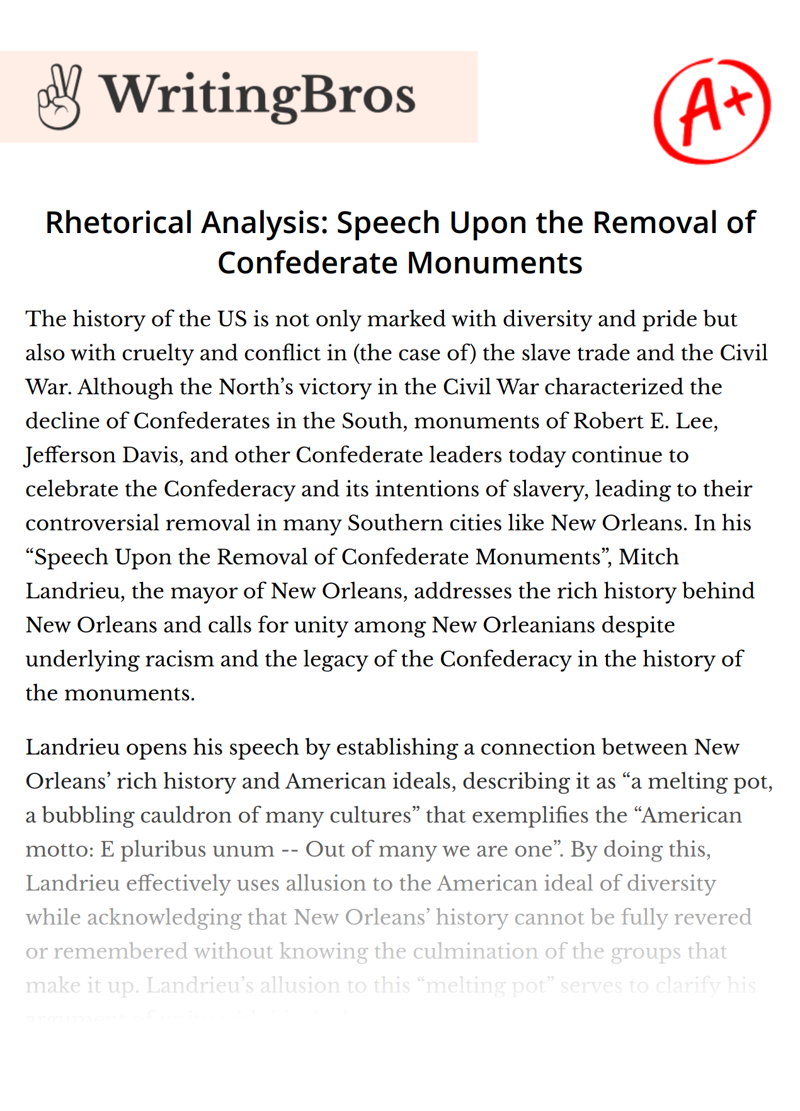Rhetorical Analysis: Speech Upon the Removal of Confederate Monuments

The history of the US is not only marked with diversity and pride but also with cruelty and conflict in (the case of) the slave trade and the Civil War. Although the North’s victory in the Civil War characterized the decline of Confederates in the South, monuments of Robert E. Lee, Jefferson Davis, and other Confederate leaders today continue to celebrate the Confederacy and its intentions of slavery, leading to their controversial removal in many Southern cities like New Orleans. In his “Speech Upon the Removal of Confederate Monuments”, Mitch Landrieu, the mayor of New Orleans, addresses the rich history behind New Orleans and calls for unity among New Orleanians despite underlying racism and the legacy of the Confederacy in the history of the monuments.
Landrieu opens his speech by establishing a connection between New Orleans’ rich history and American ideals, describing it as “a melting pot, a bubbling cauldron of many cultures” that exemplifies the “American motto: E pluribus unum -- Out of many we are one”. By doing this, Landrieu effectively uses allusion to the American ideal of diversity while acknowledging that New Orleans’ history cannot be fully revered or remembered without knowing the culmination of the groups that make it up. Landrieu’s allusion to this “melting pot” serves to clarify his argument of unity with ideals that appeal to his American audience. Landrieu then proceeds to juxtapose this diverse image of New Orleans with its dark past in slavery and slave markets. By doing this, Landrieu serves to fill in the omissions of history these monuments and their supporters hold. He depicts New Orleans as “one of America’s largest slave markets, a port where hundreds of thousands of souls were bought, sold, and shipped up the Mississippi River to lives of forced labor, of misery, of rape, and of torture.” Through this juxtaposition, Landrieu is able to effectively establish counterargument to a commonly held view that the monuments represent history as he reasons as to “why there are no slave ship monuments, no prominent markers on public land to remember the lynchings or the slave blocks;”. It forces these “self-appointed defenders of history and monuments” to consider the significance of this portion of New Orleans’ history and establishes logos in his basis of argument in reason over “politically correct” values. Landrieu continues to emphasize the flaws in the historical meaning of these Confederate statues in the history it has omitted. Landrieu details the parallelism between a Confederate statue and a slave auction block described as “a stone where day after day, for years, men and women… bound and bought and sold, and bid like cattle...the singular thing we chose to commemorate as ‘history’ with a plaque were the unmemorable speeches of these two powerful men”. It is such an idea that would reinforce Landrieu’s argument to recognize the misrepresentation of New Orleans’ rich and diverse history in these statutes.
Landrieu proceeds to delve into the legacy of the Confederacy and its negative connotation that the monuments possess. Landrieu acknolwedges the blatant racism of the Confederacy, describing the true goals of the Confederacy as a cause of “maintaining slavery and white supremacy”. He calls his audience to consider these goals through the “Cornerstone Speech” made by Alexander Stephens, the Vice President of the Confederacy. Landrieu reveals the racist idea that “the Confederacy’s corner-stone rests, upon the great truth, that the negro is not equal to the white man;”. Through this, Landrieu is able to establish logos in his assertion of the cruel ideas of the Confederacy that is linked with these Confederate monuments. The history of these monuments, according to Landrieu, was “to celebrate a fictional, sanitized Confederacy: ignoring the death, ignoring the enslavement...erected purposefully to send a strong message to all who walked in their shadows…” Indeed, the monuments were built upon oppression and racism of the Confederacy that served to divide New Orleans more than the removal of the Confederate monuments. Landrieu continues to question supporters of these Confederate monuments by establishing a non-accusatory tone through his own personal experience. Although he “grew up in one of New Orleans’ most diverse neighborhoods,'' Landrieu admits of his apathy towards the monuments and the exclusionary attitudes New Orleans had developed. However, Landrieu calls his audience to consider the perspective of an African American mother or father explaining why Robert E. Lee “sat atop our city”. Landrieu employs rhetorical questions like “Can you look into the eyes of this young girl and convince her that Robert E. Lee is there to encourage her?” to induce empathy while developing a pressing tone that calling his audience to remember the role monuments should play in a city like New Orleans. Indeed, Landrieu calls his audience to consider the negative connotations of the monuments and the underlying Confederacy history they hold. Landrieu advocates for unity among New Orleanians by illustrating a diverse and inclusive future for New Orleans through culture. Landrieu addresses the importance of diversity as an “essential truth” in its role to unify New Orleans together while establishing.
Cite this Essay
To export a reference to this article please select a referencing style below

